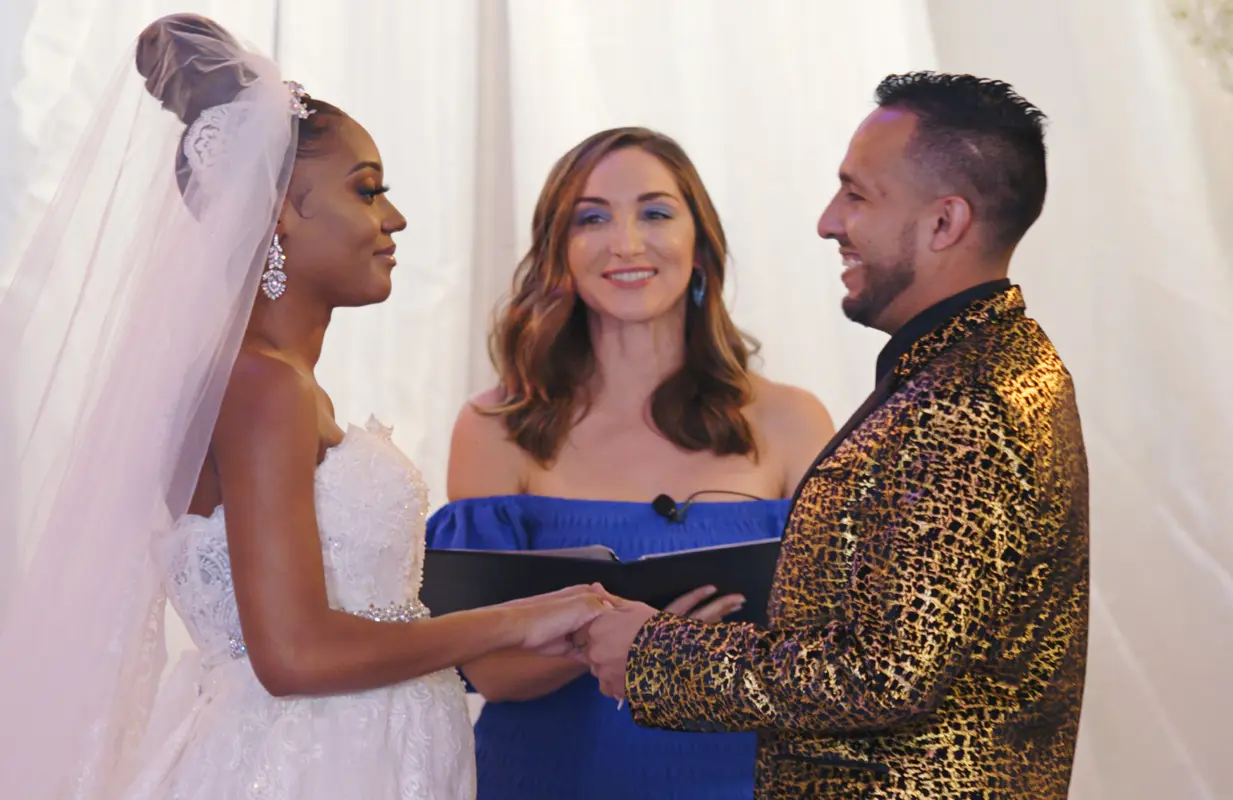Netflix Is Putting a New Spin on TV's Wedding Reality Complex
-
 Host Jamie Lee with soon-to-be newlyweds Savannah and Cesar in The Wedding Coach. (Photo: Netflix)
Host Jamie Lee with soon-to-be newlyweds Savannah and Cesar in The Wedding Coach. (Photo: Netflix)Historically the target audience for most wedding reality shows hasn't necessarily been people planning weddings so much as rubberneckers who delight in the trainwreck factor. It's not an accident that the term Bridezilla was popularized by the basic cable show of the same name. But it's hardly the only offender in this department: Say Yes to the Dress, My Fair Wedding, and anything with "Big Fat" in the title all thrived on mess, even as they purported to be helping couples' wildest, most extra dreams become reality. I should come as no surprise that the genre peaked in the early 2000s -- in other words, the most judgy era of reality tv — but the stereotype lives on.
Soon-to-be brides and grooms who are typically dreaming of their own weddings come away from shows like these with mixed messages: your day has to be perfect, but also, don't be too demanding. It's the greatest day of your life, and you have to splash out, but don't spend too much money. Your special day should be a perfectly unique reflection of who you are as a couple, but focus too hard on that intricate cake or choreographed first dance and you're a spoiled brat. You need a giant party. Your giant party is tacky. It's a fine line to tread.
While a reality show might provide the occasional spark of event-planning inspiration or Pinterest fodder, by and large, the weddings featured in this genre function mainly to tell prospective wedding participants what not to do.
With two new offerings, Netflix has sought to both circumvent that judginess and provide actually useful information to the affianced. In Marriage or Mortgage, which premiered March 10, wedding planner Sarah Miller and realtor Nichole Holmes compete for the savings of an engaged couple by pitching them dream weddings and dream homes that fit their nest egg. The Wedding Coach, which drops April 7, features comedian Jamie Lee solving wedding-related conundrums in a role that appears to be one part wedding planner, one part therapist.
Perhaps the most refreshing facet of Lee's approach is the acknowledgement that, in her own words, "wedding perfection is unattainable" but "wedding stress is real." Whether Lee is tasked with setting up centerpieces or helping couples navigate family squabbles, The Wedding Coach seems less concerned with turning personal drama into entertainment than it is with squashing said drama altogether. In other words, most episodes appear to culminate with an awful lot of cathartic hugging; whether or not the wedding itself goes off without a hitch seems almost immaterial.
Miller and Holmes also trade in realistic expectations, given that the entire premise of Marriage or Mortgage acknowledges that the money spent on a typical American wedding could fund a down payment on a house. It's an odd conceit for a wedding show to suggest that maybe some couples shouldn't even have a wedding, but it refrains from suggesting one is always better than the other, merely noting what's possible given the parameters.
As Miller and Holmes show the couple potential big bashes or dream homes, they're careful to note that spending big in one area usually means cutting back in another, and when they're inevitably able to wrangle an extra perk, it's always regarded as a nice surprise without a hint of entitlement. Neither are they mean-spirited: each host always celebrates the other's great ideas and congratulates the couple on making a great choice, even when their own pitch isn't chosen.
This isn't to say that there isn't the odd moment that caters to the trainwreck-chasers; the couples featured on both shows are, at the end of the day, the kinds of people who ar willing to go on reality shows, which means there's bound to be something to cater to our judgiest instincts. There will be plenty of opportunities to yell at the screen when, say, the Marriage or Mortgage choice is down to a brand new 3-bedroom townhouse with a pre-decorated nursery versus a custom-made ranch-dressing fountain for the nuptials.
And naturally, when The Wedding Coach features cameos from comedians like Fortune Feimster (The Mindy Project) and YouTube star Mamrie Hart, there's no way to avoid snark. But on balance, there's more laughing with than laughing at, and the goal of both shows is always to keep things in perspective. When Jamie Lee points out that a groom's over-the-top first-dance moves are reminiscent of a Super Bowl halftime show, he laughingly admits that the Super Bowl was, in fact, his inspiration.
Perhaps most refreshing of all, both The Wedding Coach and Marriage or Mortgage seem to encourage their couples to avoid losing sight of the fact that the wedding is a precursor to an actual marriage — an idea that comes into sharp focus when several of the Marriage or Mortgage couples chose the former and reported back that their plans were scuttled by COVID-19. And to the show's credit, whether or not the expected wedding or house purchase proceeded as planned, the couples still appear to be in love and excited for the future.
Jessica Liese has been writing and podcasting about TV since 2012. Follow her on Twitter at @HaymakerHattie.
TOPICS: The Wedding Coach, Netflix, Marriage or Mortgage